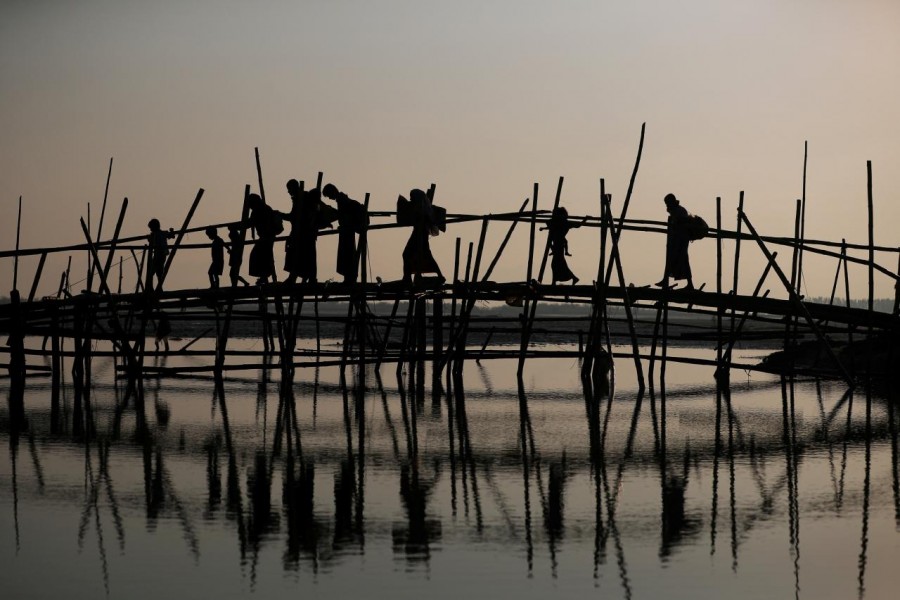One year after the mass exodus of Rohingya people from Myanmar to Bangladesh following the military crackdown, it has become crystal clear that repatriation of these 'most persecuted' people to their homeland will not take place anytime soon.
And this prompted the stakeholders -- local and international -- to pull their socks up to make the stay of around one million Rohingya refugees in Bangladesh more comfortable.
An 'arrangement' signed between Myanmar and Bangladesh on November 23 last year promised quick repatriation.
After signing the agreement, foreign office high-ups in Bangladesh were given assurance of starting the repatriation by January 2018.
But with the passage of time, things have become more complicated prompting many to believe that Myanmar is not sincere at all in taking back the Rohingya people.
Rohingya themselves are most convinced among the stakeholders that they are here to stay for a long time as 'safe, dignified and sustainable' repatriation would be almost impossible unless the Myanmar regime would take a U-turn on their policy to consider Rohingya as outsiders.
"Why should we go back when we know that our lives will be at stake in Rakhine," 32-year-old Rehana Begum, a Rohingya refugee from Maungdaw in Rakhine, told the FE recently.
Rehana who is staying at the Kutupalong refugee camp said two of her brothers were killed by Myanmar military during the crackdown last year.
Talking about repatriation, Foreign Secretary M Shahidul Haque said repatriation is a complicated process everywhere in the world.
"Nobody can set a deadline for the repatriation, considering the complex nature of the process," he told the FE.
He said the Bangladesh government would leave no stone unturned to achieve its goal to repatriate the Rohingya in a safe, dignified and sustainable manner.
Former foreign secretary Ambassador Towhid Hossain said, "If Myanmar does not change its mindset, safe and dignified return of the Rohingya would be impossible."
They have to resolve the citizenship issue first to ensure dignified return of the Rohingya, otherwise the Rohingya people would not go there voluntarily, he pointed out.
But so far the Myanmar authorities seem to be unmoved by the catastrophe it has imposed on Bangladesh.
Even two days ago, Myanmar leader Aung San Suu Kyi defended her government's actions in Rakhine state which have forced more than 700,000 Muslim-majority Rohingya to flee their home and seek refuge in neighbouring Bangladesh.
Speaking at a lecture in Singapore in which she reviewed her first two years in power, Aung San Suu Kyi refused to recognise the atrocities committed by the Myanmar military and instead justified her government's campaign against the beleaguered Muslim community, said international media reports.
"We, who are living through the transition in Myanmar, view it differently than those who observe it from the outside and who will remain untouched by its outcome," she said in an apparent response to criticism of how her government handled the plight of the Rohingya.
Aung San Suu Kyi also said it was difficult to say when the Rohingya would be able to return, and appeared to cast blame on Bangladesh for the delay.
"It's very difficult for us to put a timeframe on it by ourselves unilaterally, because we have to work with Bangladesh in order to do that."
Knut Ostby, a UN resident and humanitarian coordinator in Myanmar, said the repatriation agreement had been beset by repeated delays and authorities had yet to allow them access to the region.
So, it is quite natural that when the diplomats are talking about repatriation, Rohingya are still coming fearing threats to their lives.
According to the UNHCR, Rohingya people are still coming and after January this year, 12,900 Rohingya fled Myanmar to Bangladesh.
However, during his last visit to Bangladesh, Myanmar's Social Welfare Minister Win Myat Aye, who is leading rehabilitation efforts in Myanmar's western Rakhine state, visited Rohingya camps in Cox's Bazar and assured them that Myanmar wanted to take them back.
He told them to fill up the national verification cards (NVC) which, he said, is a precondition for applying for citizenship.
But Rohingya people brushed aside the idea saying that previously many of them filled up NVCs but at the end of the day they were denied citizenship.
"It is just eyewash, they are killing time," said Rabiul, a refugee living in the Balukhali camp.
So at the end of the day, the future of Rohingya remains uncertain as Pavlo Kolovos, head of mission of the Medecins Sans Frontieres (MSF) in Bangladesh said, "While Bangladesh showed extraordinary generosity by opening its doors to the refugees, the future for the Rohingya community here remains uncertain".
"They have limited access to justice to defend their rights. By refusing to acknowledge the legal rights of Rohingya as refugees, or granting them any other legal status, intervening governments and organisations keep them in a state of acute vulnerability," he added.
Many international organisations have issued statements calling the world community to come forward to help the Rohingya.
International Development Secretary Penny Mordaunt of the United Kingdom in a statement on Friday said: "It is clear what the international community must now do, and what Burma must do. These people need their lives back and their rights guaranteed."
"On this anniversary of such barbarism, we should recommit ourselves to ensuring that Burma cooperates with the tasks of the international community and that nations work to meet to needs of these vulnerable people."
Marking the anniversary of the exodus, the Amnesty International said world leaders' failure to act allowed the Myanmar security forces' perpetrators of crimes against humanity to remain at large for a year after their murderous campaign against the Rohingya prompted an exodus of epic proportions.


